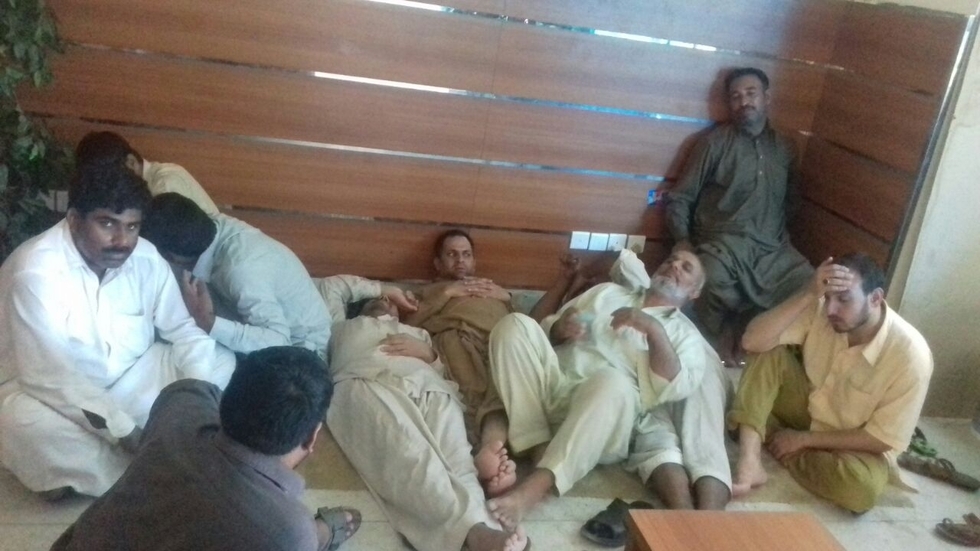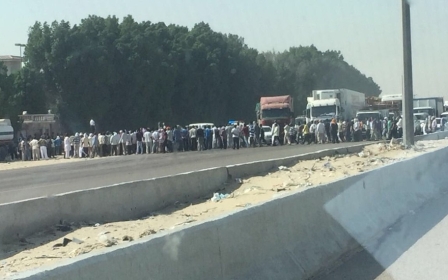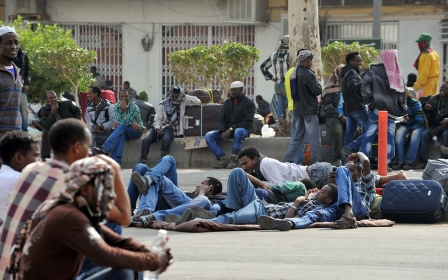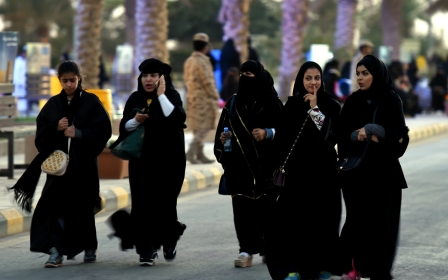Saudi building firm offers starving workers $1 pay settlement

Company bosses at Saudi construction firm United Seemac on Wednesday offered a pay settlement of just $1 to 215 foreign staff owed nearly $1m, workers told Middle East Eye.
The staff, who come from Pakistan, India, the Philippines, and Indonesia, are owed SAR 3.5m ($932,000) and haven’t been paid for between six and 20 months.
Angry at United Seemac's repeated broken promises about payments, the workers broke into the company's head office in Riyadh on Sunday and have slept there in protest for the past four days.
On Wednesday, after promising his staff's embassies that they would be paid this week, general manager Abu Mohammed offered the 215 men a paltry $266, which worked out at SAR4.5 ($1) each.
Despite having no money left to survive, or to send back home to support their families, the workers refused, and said they would continue their strike at the head office.
“We haven’t been home in five days,” Pakistani Naeem, 25, told MEE by phone. “We haven’t changed our clothes, and we haven’t eaten for two days now.
“When he offered us the money we asked him how we could survive with this amount. We came here to get our money and we won’t leave. We are waiting, hoping for something to change.”
Naeem has been a quantity surveyor at United Seemac for the past four years. He hasn’t been paid his monthly salary of SAR 2,600 ($692) for nine months.
He is unmarried but his parents back home in the Punjabi city of Sargodha have relied on his remittances for the past four years and are now struggling without his money.
After rejecting the pay offer from management, Naeem said the general manager threatened to phone police to have the workers thrown out of the office. It is a threat that carries the promise of prison, as in Saudi Arabia strikes and protests are strictly banned by law.
However, this hasn’t deterred the desperate workers, who Naeem said had partly decided to move to the head office due to squalid living conditions in company accommodation.
In August MEE obtained footage of United Seemac accommodation, where 170 people shared just four bathrooms in sweltering summer heat without air conditioning.
A month on and Naeem said the conditions have deteriorated in the camp.
“There is no water now,” he said. “It’s very bad - there is no cleaning, no anything. It’s unlivable.”
In a desperate effort to advance their cause, about 90 workers gathered outside the plush Riyadh home of United Seemac owner Mohammed Owaideh on 15 September.
“We went to his house and asked to speak to him,” Naeem said. “But he refused to come out and instead phoned the police.”
When the police arrived they briefly detained four protesters - including Naeem - before releasing and ordering them not to repeat their protest and instead take their issues to the labour court.
“But we filed cases with the labour court more than one year ago,” Kamran Bhatti, a United Seemac surveyor for five years who has not been paid in 14 months, told MEE. “They have done nothing."
“It is the law in Saudi Arabia that you cannot protest - but we don’t have any other option,” Naeem said.
The workers said they have been in touch with their embassies, who have offered some help but refused to intervene aggressively.
Representatives from India, Pakistan and the Philippines have all visited Saudi Arabia to try and resolve a situation that across the kingdom has left at least 30,000 of their citizens stranded.
The situation at United Seemac, which previously told MEE it has not paid staff because the government hasn’t paid up for contracted work, is one that is mirrored at larger employers in Saudi Arabia.
Construction giants Saudi Oger and the Bin Ladin Group have both laid off thousands of workers, the vast majority of them foreign, who have subsequently ended up trapped in the kingdom while waiting to have their pay arrears settled.
In the kingdom's east, unpaid workers at the Saad Group, which owns a private hospital in the Gulf coast city of Khobar, blocked a road in the town of al-Hassa on Tuesday to protest not being paid for seven months.
The construction industry crash is part of an economic crisis that has swept the kingdom, with the government posting a record budget deficit of $98bn in 2015. Low oil prices, which accounts for 80 percent of government income, has been blamed as causing the crisis.
New MEE newsletter: Jerusalem Dispatch
Sign up to get the latest insights and analysis on Israel-Palestine, alongside Turkey Unpacked and other MEE newsletters
Middle East Eye delivers independent and unrivalled coverage and analysis of the Middle East, North Africa and beyond. To learn more about republishing this content and the associated fees, please fill out this form. More about MEE can be found here.




